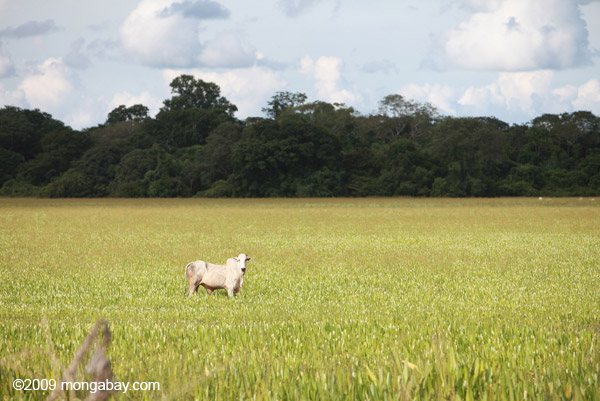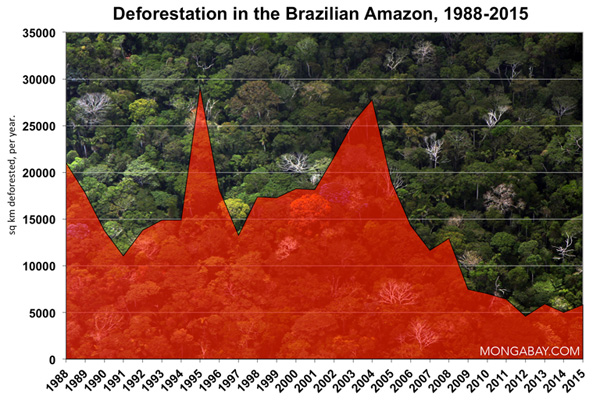
Cow in Mato Grosso.
The world’s largest meat processor has agreed to stop buying beef from ranches associated with slave labor and illegal deforestation in the Brazilian Amazon, according to the public prosecutor’s office in the state of Acre. The deal absolves JBS-Friboi from 2 billion reals ($1.3 billion) in potential fines and paves the way for the firm to continue selling meat to companies concerned about their environmental reputation.
The agreement is significant because it was signed by prosecutors from other Amazon states including Rondonia, Amazonas, Roraima, Pará, Tocantins, Maranhão and Amapá. Other cattle giants are expected to follow suit.
Under the terms of the deal, JBS agreed to stop buying cattle from areas embargoed by environmental inspection agencies and lands classified as conservation units or indigenous territories, unless the management plans of those areas allow for livestock. Cattle production often occurs illegally in forests zoned for conservation or indigenous use and squatters are used as proxies to grab the land. JBS will also not buy cattle from ranches that have been convicted of labor abuses, including slave labor.
From September 2012, JBS will only buy meat from ranches that have registered their holdings with the government and have the proper environmental licenses.
Any breach of the agreement could result in fines up to 500 reals ($300) per pound of beef.

The deal could help curtail deforestation for cattle production — which accounts for the bulk of deforestation in the Brazilian Amazon — but its effectiveness still hinges on local governance, where corruption remains a problem. The government is working to improve the situation by arresting environmental officials linked to graft and increasing the transparency of the registration process by making more information available on the Internet, but some states are further along in the process than others.
The news comes nearly two years after Brazil’s biggest meatpackers agreed to a moratorium on new forest clearing for cattle production. The agreement was spurred by a Greenpeace campaign that linked some of the world’s most prominent brands — Nike, Timberland, and Adidas — to deforestation in the Amazon rainforest. The companies responded by refusing to buy cattle products unless they were shown to be free of deforestation.
Deforestation continues to ebb in the Brazilian Amazon. Annual deforestation is down by more than three-quarters since 2004 despite a rise in commodity prices. Improved law enforcement, an increase in the number of protected areas, growing sensitivity in the corporate sector to environmental issues, and macro-economic trends are generally credited for the decline.
Related articles
Concerns over deforestation may drive new approach to cattle ranching in the Amazon

(09/08/2009) While you’re browsing the mall for running shoes, the Amazon rainforest is probably the farthest thing from your mind. Perhaps it shouldn’t be. The globalization of commodity supply chains has created links between consumer products and distant ecosystems like the Amazon. Shoes sold in downtown Manhattan may have been assembled in Vietnam using leather supplied from a Brazilian processor that subcontracted to a rancher in the Amazon. But while demand for these products is currently driving environmental degradation, this connection may also hold the key to slowing the destruction of Earth’s largest rainforest.







